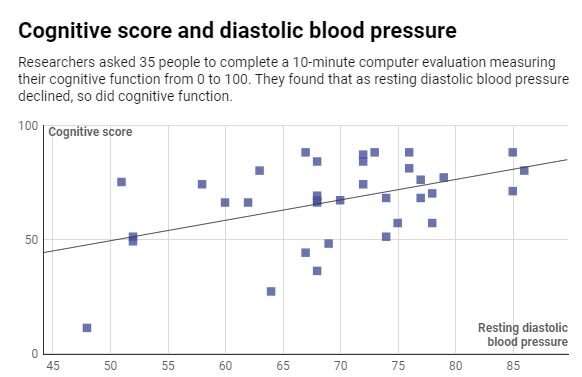
Decline in brain function often occurs as people age. People often worry that declining brain function is an inevitable part of growing old and will lead to dementia, but it is not. Many people do not experience age-related cognitive decline.
Clinical studies that have followed older individuals over many years have consistently demonstrated that chronically low blood pressure increases the risk of age-related cognitive decline. For example, a study published in 2017 followed more than 24,000 people for up to 27 years. This study showed that low blood pressure is a significant predictor of cognitive decline and the probability of developing dementia. This was independent of age, gender, weight, cardiovascular, kidney or diabetic status.
Low blood pressure is associated with decreased blood flow to the brain when an individual is sitting or standing. Many researchers have come to believe that insufficient brain blood flow plays a critical role in the development of dementia, Alzheimer’s and perhaps even Parkinson’s disease. Some believe that it may even play the primary role.
Those of us who study the link between low blood pressure and cognitive performance need to determine what “too low” a blood pressure means in an individual person. This would allow health care providers to know when to intervene and correct a person’s low blood pressure. My team and I at the Clinical Science and Engineering Research Lab at Binghamton University are addressing this question.
What constitutes low blood pressure?
In our research, we are utilizing data obtained from a relatively new quantitative assessment tool cleared by the FDA for evaluating cognitive function in people over the age of 50 years, who have a high school degree or higher educational level.
This computer-based evaluation, which takes about 10 minutes for an individual to complete, provides clinicians and researchers with a reproducible assessment of cognitive function on a scale of 0-100. A score above 75 places the person in the expected cognitive function range for their age, while a score between 50 and 75 indicates an individual is in the below-normal range—and correspondingly, at increased risk of developing dementia. A score below 50 is indicative of an individual having many characteristics of dementia syndrome.
We have been comparing cognitive function scores in 50-95-year-olds to their resting blood pressures. Blood pressure is determined by measuring how much pressure is required to stop blood flow in the arteries of your arm. Resting blood pressure refers to your blood pressure after you have been sitting quietly for 10-15 minutes in a nonstressful environment. This is the blood pressure most older Americans experience most of the day, as older Americans are, on average, sedentary for over 9 hours.
Our previous work showed that of the two components of blood pressure – systolic and diastolic – diastolic blood pressure is the better predictor of cognitive performance. Diastolic blood pressures measures your blood pressure when your heart is relaxing and is the “lower number” of your blood pressure reading. We are focusing on this aspect of blood pressure.
Though our study is ongoing, two clear patterns are already developing in the data we have obtained from healthy subjects who have volunteered to be in the study—that is, people who have not been diagnosed with dementia or any other cognitive disorder.

First, low resting diastolic blood pressure is remarkably common. Over 85% of otherwise healthy 50-95-year-old subjects, in our study, have below normal resting diastolic blood pressures. This observation, by itself, would not necessarily be cause for concern. However, three-fourths of those we have studied so far, a total of 42 to date, with below normal blood pressure also test in the “below normal” cognitive function range.
Low blood pressure, also called hypotension, is usually defined as having a blood pressure low enough to cause dizziness, blurry vision or fainting. These symptoms typically occur with a diastolic pressure below 60 millimeters of mercury, or mmHg. Doctors tend not to be concerned about low blood pressure until diastolic pressure falls below this level.
Our data indicate that even individuals with diastolic blood pressures well above this 60mmHg threshold are unable to support normal cognitive function when upright. Indeed, at essentially any resting diastolic blood pressure below normal (80mmHg), the trend in the data indicates that cognitive performance in older adults is significantly reduced. Interestingly, these results are consistent with earlier reports of detrimental influences of low blood pressure on cognitive function even in young adults.
The surprising role of calf muscles
Low diastolic pressure can arise as a result of medication use, heart failure or other health complications. But, in most people, it is simply a matter of the heart not pumping out enough blood with each stroke; in other words, low cardiac output. And low cardiac output occurs when not enough blood is being returned to the heart from the lower body.
The soleus muscles, specialized muscles in the middle of your lower legs, are responsible for pumping blood back up to the heart. Over the last decade, our research team has demonstrated how the soleus muscles plays a critical role in maintaining normal blood pressure during sedentary activities.
An effective strategy for maintaining normal blood pressure, and brain blood flow, is to “re-train” your soleus muscles. These deep postural muscles are most active during activities such as sustained squatting or toe standing. You can rebuild these muscles by regularly undertaking such activities, though it requires hours a day of exercise.
Alternatively, “passive exercise” options exist which permit the “training-up” of your soleus muscles more conveniently. Both electrical and mechanical, soleus stimulation approaches have been shown to significantly increase venous return to the heart.
Preliminary clinical studies have also provided confirming evidence that raising resting diastolic blood pressure through daily soleus muscle stimulation, over a period of several months, can reverse the cognitive impairment associated with aging.
No treatments currently exist for dementia, and no potential treatment seems to be on the horizon, and so the health care community has become much more focused on slowing, or reversing, cognitive aging to prevent progression to dementia.
Source: Read Full Article
